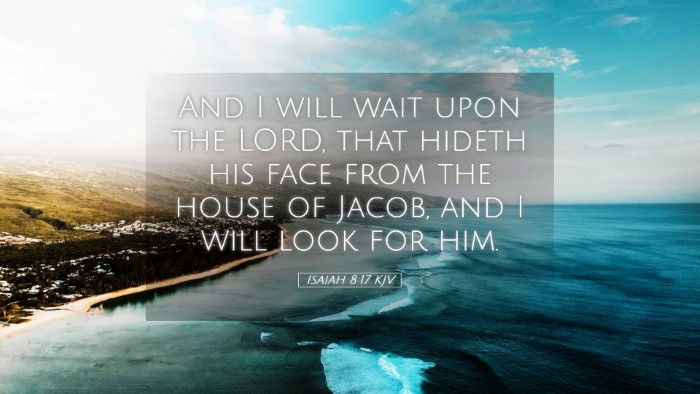Commentary on Isaiah 8:17
Isaiah 8:17 states: “And I will wait upon the LORD, that hideth his face from the house of Jacob, and I will look for him.” This verse reflects a profound and poignant moment within the prophetic ministry of Isaiah, encapsulating themes of expectation, faith, and the hidden nature of God's presence.
Context and Background
This passage occurs in a period of great turmoil for the people of Judah, facing threats from the Assyrian empire. The historical backdrop is essential for understanding the depth of Isaiah's words. The nation, plagued by sin and rebellion, finds itself in a crisis; thus, God’s apparent distance evokes despair.
Theological Insights
The verse serves as a key to interpreting the spiritual climate of the time. Isaiah’s declaration reflects a heart that chooses to wait on the Lord, even when His face seems hidden. This act of waiting is deeply theological, rooted in a trust that transcends visible circumstances.
- The Nature of Waiting: Matthew Henry emphasizes that waiting on God is not an idle task; it is an active, expectant engagement. It involves patience and trust in the divine timing and character.
- God’s Hiddenness: Albert Barnes elaborates on the notion of God's hidden face. This can signify God’s withdrawal due to the sins of His people, a theme woven throughout Scripture, suggesting that God allows difficulties to turn hearts back to Him.
- Hope in Darkness: Adam Clarke notes that waiting implies hope amidst despair. Just as night is followed by dawn, the believer's trust assures them that God will eventually reveal Himself, fulfilling His promises.
Exegesis of Key Phrases
Each phrase of the verse contains significant meaning:
- “I will wait upon the LORD”: This phrase indicates a deliberate choice. The Hebrew word for "wait" (קָוָה, qavah) reflects an intense anticipation. It implies a binding of oneself to God's will.
- “That hideth his face”: This motif signifies more than mere absence; it suggests a temporary situation of divine discipline or an opportunity for personal introspection and repentance.
- “From the house of Jacob”: This designation rather starkly reminds readers of the heritage of Israel, from whom blessings were known yet unheeded, further enhancing the significance of their current plight.
- “I will look for him”: The expression encapsulates a dual action—an active seeking that mirrors both watchfulness and expectation. It manifests both hope and a proactive faith.
Application for Pastoral Ministry
This verse serves as a rich foundation for pastoral ministry. It addresses the reality of spiritual dryness and the feelings of abandonment that many experience. Pastors are encouraged to guide their congregations toward active waiting on the Lord, fostering a deeper dependency on Him in times of uncertainty.
Practical steps include:
- Encouraging Prayer: Promote a culture of persistent prayer that echoes Isaiah’s declaration—waiting on the Lord in prayerful expectation.
- Teaching on God’s Nature: Expound on God’s faithfulness and the assurance that He is always present, even when unseen.
- Community Support: Foster community among church members that encourages each other during difficult times, reminding them of God’s promises.
Insights for Theologians and Scholars
For scholars, Isaiah 8:17 presents various avenues for theological reflection. The theme of divine hiddenness requires robust exploration, as seen in diverse perspectives throughout both historical and contemporary theology. It invites dialogue about the implications of God’s sovereign will against the backdrop of human disobedience and the intricate interplay of divine justice and mercy.
Questions for Further Study:
- What does the hiddenness of God teach us about faith?
- How does Isaiah’s waiting translate into a model for modern Christian living?
- What are the implications of this verse for understanding God's timing in relation to human suffering?
Conclusion
Isaiah 8:17 illuminates a powerful testimony of faith amid adversity. It offers an invitation to reflect on the act of waiting upon the Lord with expectancy, even when His presence feels obscured. The insights garnered from prominent commentaries bring forth a message that is both timeless and pivotal for understanding the dynamics of faith in a world replete with challenges.


